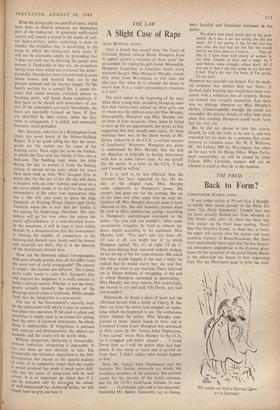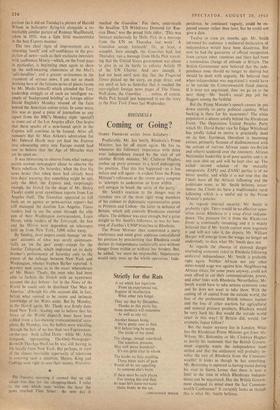THE PRESS
Back to Form? -
CHRISTOPHER BOOKER writes : It was rather unfair of Private Eye, I thought, to entitle their recent parody of the Daily Ex- press 'The Daily Getsworse.' Comets may not yet have actually flashed nor lions whelped in The Street---and, after all, there has been that little sticker on the front page reading, 'Don't Buy The Swastika Stamp,' to show that, at heart, the paper still yearns after the nastier and more eccentric features of Beaverbrookism. But there have undoubtedly been signs that the less hysteri- cal atmosphere engendered in the Express glass- house by the accession of the jovial Derek Marks to the editorship has begun to bear improving fruit. For the Photonews page to print for corn- 'Of course we lead a Spartan life— we're Spartans: parison (as it did on Tuesday) a picture of Harold Wilson in helicopter flying-kit alongside a re- markably similar picture of Ramsay MacDonald, taken in 1931. was a light little masterstroke in the best Express manner.
The two chief signs of improvement are a returning 'touch' and self-confidence in the pro- jection of news—such as their exclusive interview with yachtsman Manry--which, on the front page in particular, is beginning once again to show up the well-meaning clumsiness of the Mail's `split-headline'; and a greater seriousness in the treatment of serious news. I am not so much thinking here of the fatuous series of pieces (some by Mr. Marks himself) which attended the Tory leadership struggle as of such an intelligent ex- ample of 'background briefing' as foreign editor David English's Monday rdsum6 of the facts behind the American colour crisis. In some ways, this was as good a piece of journalism as any (apart from the BBC's Monday night 'special') to come out of the Los Angeles affair. One hopes that these sparks of a new-found spirit in the Express will continue to be fanned. After all, rumours that Sir Max Aitken's admiration for Mr. Edward Heath may yet lead the Express into advocating entry into Europe would lead one to believe that the Age of Miracles may yet be upon us.
It was interesting to observe from what vantage points. various newspapers chose to observe the Watts rebellion. On Saturday, when the first big news broke (but when there had already been two days' warning that something might be up), only the Mail, the Express and, surprisingly enough, the Sketch (in the shape of Mr. Henry Thody) could print eyewitness reports from Los Angeles itself. The Guardian appeared to fall back on an agency or news-service report—but still managed the dateline Los Angeles. Times readers had to see the scene through the able pen of their Washington correspondent, Louis Heren, while readers of the Teleqraph, the Sun and the Mirror were dependent on telescopes held up from New York, 3,000 miles away.
By Sunday, most papers could manage 'on the spot' accounts of what was surely quintessen- tially an 'on the spot' event—except for the Sunday Telegraph, which improved on its daily brother's performance of Saturday only to the extent of the mileage between New York and Washington, whence Stephen Barber reported. A mystery now arose as to the exact whereabouts of Mr. Henry Thody, the man who had been able to furbish the Sketch with an eyewitness account the day before- for in the News of the World he could only be datelined 'Our Man in America,' although his able account did, in fact, betraY what seemed to be recent and intimate knowledge of the Watts scene. But by Monday, in the Sketch again. Mr. Thody was firmly date- lined New York- leading one to believe that his News of the World dispatch must have been cabled from a fast-moving transcontinental aero- plane, By Monday, too, the bullets were whistling through the hair of no less than two Expressmen- on-the-spot both called Davis--while Mr. John Sampsoh, representing The-Only-Newspaper- Born-Of-The-Age-We-Live-In was still having to tile loyally from New York. But perhaps, in view of the ;ilmost inevitable superiority of television in covering such a situation, Messrs. King and Cudlipp were right to save their money. Pent-etre.
On Tuesday morning it seemed that an old adage was due for the chopping-block. I refer to the one which runs 'within the hour the news reached Fleet Street: the next day it reached the Guardian.' For there, underneath the headline 'US Withdraws Demand for Rus- sian Dues,' was the proud little rider: 'This was forecast exclusively by Plena Pick in a messaae from the UN on Thursday last week.' A Guardian scoop, forsooth! Or, at least, a scooplet. Sure enough, the Guardian had. last Thursday, run a message from Hella Pick reveal- ing that the United States government was about to give in on its battle to enforce Article 19 of the UN Charter. And sure enough, it had not been until next day that the Fingncial I'inzes picked up the story, on page three; and not until as late as Saturday that it reached the ever-vigilant foreign news pages of The Tines. Well done, the Guardian . . . unless, of course, Hella Pick herself just happened to see the story in the New York Tines last Wednesday.































 Previous page
Previous page